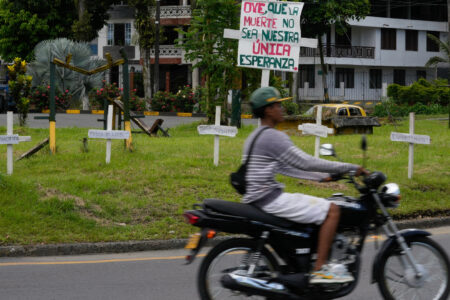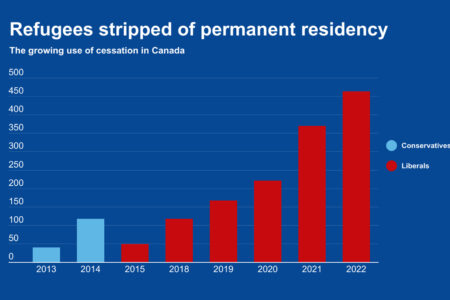
In 2017, an estimated 770,000 Rohingya were driven from their homeland, escaping from the Myanmar military campaign of mass killing, rape and systematic arson. People fled across the border to Bangladesh and now inhabit the world’s largest refugee camp, enduring militancy, poverty, and intolerable and dangerous conditions. While these refugees have been allowed to remain, their Bangladeshi hosts increasingly view them as “a big burden.”
Yet Rohingya genocide survivors have little chance of returning to Myanmar, where the military that slaughtered their people consolidated its power with a coup in February 2021. Almost six years after their exodus from their homeland, Rohingya refugees exist in a “suspended state” between global indifference and local hostility. In such dire circumstances, Canada should do more to assist one million Rohingya genocide survivors trapped in a cruel limbo.
This is not just geopolitics; this is my life. I remember vividly the day I was resettled from a camp in Bangladesh to Canada in August 2021. Landing at Toronto Pearson International Airport, I felt welcomed in a country for the first time. A woman at the immigration desk greeted me with a soothing smile and a genuine “Welcome to Canada.” In my country of birth, there were no such pleasantries. As a Rohingya, officials deemed me an “illegal immigrant” from the outset, despite the centuries of Rohingya existence in Myanmar.
Rohingya refugees are an untapped source for Canada’s workforce
In Canada, I quickly connected with a community of around 1,000 Rohingya who have made this country their new home since 2006*. I met men and women who are making valuable contributions to Canada by working in factories and volunteering for civic organizations. Their children are attending local schools and universities.
These people, and now my family and I, are living the dream of one million Rohingya still confined against their will either in the ongoing genocide in Myanmar or who have escaped to the harsh life in Bangladesh’s refugee camps. Perhaps the phrase “breathing the air of freedom” may sound like a cliché, but it rings true for a genocide survivor like me.
Following Russia’s invasion of Ukraine in February 2022, Canada opened the door for more than 132,000 Ukrainian nationals without hesitation, creating new pathways for those fleeing an uncertain future. While this humanitarian act is laudable, it’s difficult to not worry about those genocide survivors in Bangladesh who are still suffering. Canada needs to embrace a similar open-door policy for them.
I cannot shake what I endured and witnessed during the four years I was a refugee in Bangladesh. There are Rohingya families living in cramped tarpaulin shelters trying to survive on World Food Program rations, which a funding shortfall has recently reduced further.
Human Rights Watch has documented extortion, detention and other human rights violations against Rohingya refugees by Bangladeshi police in those camps, and the Bangladeshi government coercively relocated tens of thousands of them to a flood-prone island in the Bay of Bengal. A massive fire on March 5, 2023, burnt thousands of Rohingya shelters, making thousands of them homeless within a refugee camp in Bangladesh.
The camps are simply not safe, leading thousands to escape Bangladesh by boat. Hundreds have now died or are missing at the Andaman Sea. Given such a situation, the refugees’ best hope lies in resettlement in countries where brute force, exploitation and hopelessness are not the norm.
Canada has acknowledged Myanmar’s genocide of Rohingya people. In April 2018, Bob Rae, who served as special envoy to Myanmar, recommended in his final report that “a fundamental principle of Canada’s approach to the Rohingya crisis should be that we listen to the voice of the Rohingya themselves. This principle should guide our actions and inform our advocacy.”
The Rohingya community in Canada is hoping that the federal government will open the country’s arms and doors to the survivors of genocide, both those living in Myanmar and those currently enduring deplorable conditions in refugee camps elsewhere.
The incredible response to the war in Ukraine shows how wide Canada can open its doors to refugees. But it is hard not to think of the Rohingya genocide survivors who have not received the same human rights protections. This is not to take away from the generosity shown to Ukrainians, but rather to assert the importance of those who continue to face harrowing conditions elsewhere.
There are concrete steps that Canada can take for those one million Rohingya genocide survivors including establishing a Rohingya Working Group within the Government of Canada as recommended in Rae’s final report and immediately extending a commitment to resettle up to 10,000 of them from Bangladesh. Adversity is indiscriminate; it does not distinguish between Ukrainians or Rohingya. Neither should Canada.
Note to readers: This article has been updated to correct the year Canada’s Rohingya community began to establish itself.






